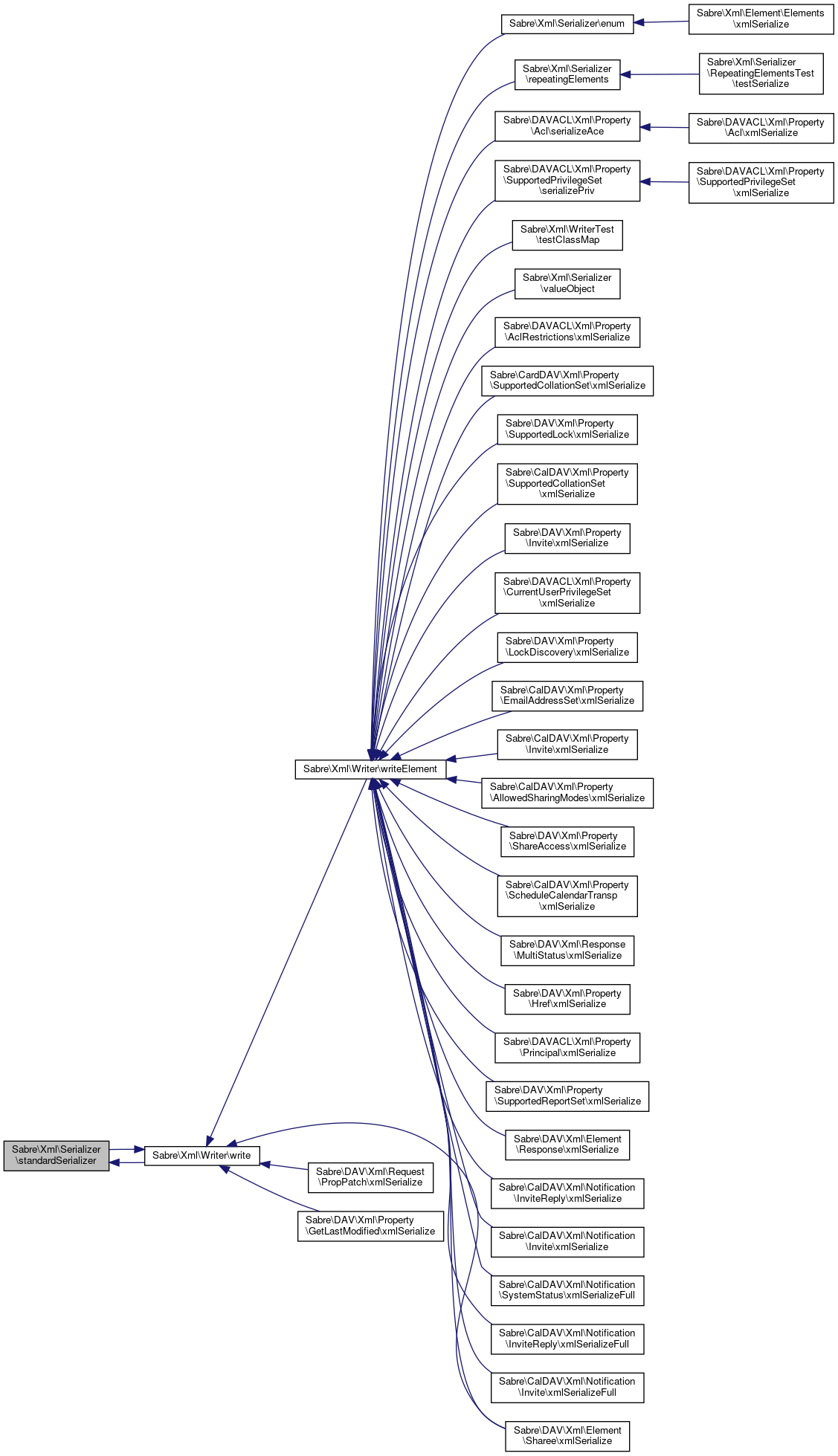Data Structures | |
| class | EnumTest |
| class | RepeatingElementsTest |
Functions | |
| enum (Writer $writer, array $values) | |
| This file provides a number of 'serializer' helper functions. More... | |
| valueObject (Writer $writer, $valueObject, $namespace) | |
| The valueObject serializer turns a simple PHP object into a classname. More... | |
| repeatingElements (Writer $writer, array $items, $childElementName) | |
| This serializer helps you serialize xml structures that look like this: More... | |
| standardSerializer (Writer $writer, $value) | |
| This function is the 'default' serializer that is able to serialize most things, and delegates to other serializers if needed. More... | |
Function Documentation
◆ enum()
| Sabre\Xml\Serializer\enum | ( | Writer | $writer, |
| array | $values | ||
| ) |
This file provides a number of 'serializer' helper functions.
These helper functions can be used to easily xml-encode common PHP data structures, or can be placed in the $classMap. The 'enum' serializer writes simple list of elements.
For example, calling:
enum($writer, [ "{http://sabredav.org/ns}elem1", "{http://sabredav.org/ns}elem2", "{http://sabredav.org/ns}elem3", "{http://sabredav.org/ns}elem4", "{http://sabredav.org/ns}elem5", ]);
Will generate something like this (if the correct namespace is declared):
<s:elem1 /> <s:elem2 /> <s:elem3 /> <s:elem4>content</s:elem4> <s:elem5 attr="val" />
- Parameters
-
Writer $writer string[] $values
- Returns
- void
Definition at line 41 of file functions.php.
References $values, and Sabre\Xml\Writer\writeElement().
Referenced by Sabre\Xml\Element\Elements\xmlSerialize().
 Here is the call graph for this function:
Here is the call graph for this function: Here is the caller graph for this function:
Here is the caller graph for this function:◆ repeatingElements()
| Sabre\Xml\Serializer\repeatingElements | ( | Writer | $writer, |
| array | $items, | ||
| $childElementName | |||
| ) |
This serializer helps you serialize xml structures that look like this:
<collection> ... ... ... </collection>
In that previous example, this serializer just serializes the item element, and this could be called like this:
repeatingElements($writer, $items, '{}item');
- Parameters
-
Writer $writer array $items A list of items sabre/xml can serialize. string $childElementName Element name in clark-notation
- Returns
- void
Definition at line 97 of file functions.php.
References Sabre\Xml\Writer\writeElement().
Referenced by Sabre\Xml\Serializer\RepeatingElementsTest\testSerialize().
 Here is the call graph for this function:
Here is the call graph for this function: Here is the caller graph for this function:
Here is the caller graph for this function:◆ standardSerializer()
| Sabre\Xml\Serializer\standardSerializer | ( | Writer | $writer, |
| $value | |||
| ) |
This function is the 'default' serializer that is able to serialize most things, and delegates to other serializers if needed.
The standardSerializer supports a wide-array of values.
$value may be a string or integer, it will just write out the string as text. $value may be an instance of XmlSerializable or Element, in which case it calls it's xmlSerialize() method. $value may be a PHP callback/function/closure, in case we call the callback and give it the Writer as an argument. $value may be a an object, and if it's in the classMap we automatically call the correct serializer for it. $value may be null, in which case we do nothing.
If $value is an array, the array must look like this:
[ [ 'name' => '{namespaceUri}element-name', 'value' => '...', 'attributes' => [ 'attName' => 'attValue' ] ] [, 'name' => '{namespaceUri}element-name2', 'value' => '...', ] ]
This would result in xml like:
<element-name xmlns="namespaceUri" attName="attValue"> ... </element-name> <element-name2> ... </element-name2>
The value property may be any value standardSerializer supports, so you can nest data-structures this way. Both value and attributes are optional.
Alternatively, you can also specify the array using this syntax:
[ [ '{namespaceUri}element-name' => '...', '{namespaceUri}element-name2' => '...', ] ]
This is excellent for simple key->value structures, and here you can also specify anything for the value.
You can even mix the two array syntaxes.
- Parameters
-
Writer $writer string|int|float|bool|array|object
- Returns
- void
Definition at line 164 of file functions.php.
References $attributes, $name, Sabre\Xml\Serializer\standardSerializer(), Sabre\Xml\Writer\startElement(), Sabre\Xml\Writer\write(), and Sabre\Xml\Writer\writeAttributes().
Referenced by Sabre\Xml\Serializer\standardSerializer(), and Sabre\Xml\Writer\write().
 Here is the call graph for this function:
Here is the call graph for this function: Here is the caller graph for this function:
Here is the caller graph for this function:◆ valueObject()
| Sabre\Xml\Serializer\valueObject | ( | Writer | $writer, |
| $valueObject, | |||
| $namespace | |||
| ) |
The valueObject serializer turns a simple PHP object into a classname.
Every public property will be encoded as an xml element with the same name, in the XML namespace as specified.
Values that are set to null or an empty array are not serialized. To serialize empty properties, you must specify them as an empty string.
- Parameters
-
Writer $writer object $valueObject string $namespace
Definition at line 61 of file functions.php.
References $key, $namespace, and Sabre\Xml\Writer\writeElement().
 Here is the call graph for this function:
Here is the call graph for this function:






